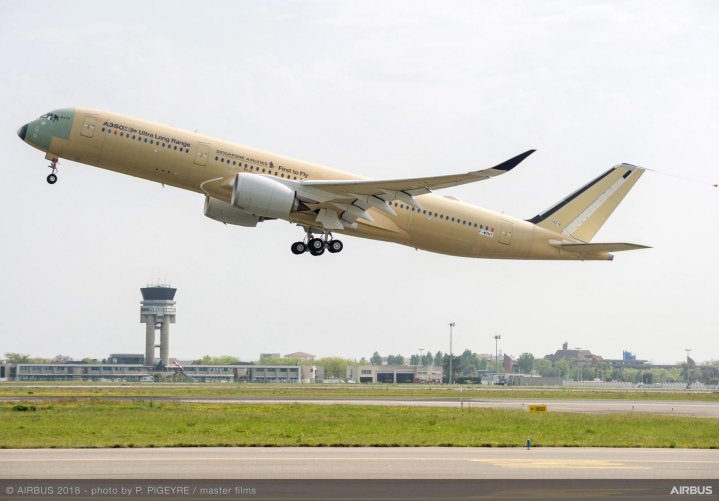
Let’s face it, really long flights aren’t for everyone.
Wedged into a coach seat for 16-plus hours, the seat in front fully reclined, and your neighbors having claimed the armrests minutes after sitting down, such journeys can be brutal for both body and mind.
Well, folks, with aircraft becoming more fuel efficient, even longer flights are on the horizon.
Take Airbus. The company’s ultra-long-range A350-900 XWB can fly for a staggering 20 hours without needing to refuel. In that time, it can cover 9,700 nautical miles, 1,600 more than the current A350-900 aircraft.
The aerospace giant has just completed the first test flight of its newest A350. The plane took off from the company’s Toulouse headquarters on Monday, performing a short flight over the south of France before returning to base.
Singapore Airlines is the first customer and has ordered seven of the aircraft, which besides an enhanced fuel system also features improved aerodynamics. The carrier will deploy the new planes on routes between Singapore and the U.S., with several of them flying between Singapore and New York City. The colossal 19-hour trip will make it the longest commercial flight to date, beating the current record holder — Qatar Airways’ service between Doha and Auckland, New Zealand — by almost an hour.
Airbus says the new aircraft incorporates “the latest aerodynamic design, carbon fiber fuselage and wings, plus new fuel-efficient Rolls-Royce engines.”
The plane boasts a 25-percent reduction in fuel burn and emissions, and significantly lower maintenance costs, with an “Airspace” cabin offering “absolute well-being on board with the quietest twin-aisle cabin and new air systems.”
Combining a range of up to 9,700 nautical miles and the highest level of passenger comfort, the Ultra Long Range #A350 XWB opens the way for the world’s very longest flights, with unbeatable economics. pic.twitter.com/FiWTkuKxnj
— Airbus (@Airbus) April 23, 2018
Whichever way you look at it, 19 hours is a long time to spend in a metal tube at 36,000 feet, so it’s just as well that most of the seats on the Singapore-New York route will be business class, offering a decent amount of space and allowing travelers to keep out of each others’ faces.
The A350-900 XWB already looks like it could be a winner for Airbus. By March 2018, the company had received more than 850 orders for it from 45 customers around the world, making it one of the most successful wide-body aircraft ever — before it has welcomed a single passenger.
Materials are the key to aircraft endurance and efficiency
Airbus engineers achieve gains in efficiency and endurance by balancing a multitude of factors. One of the major considerations involves choices of metal alloys versus composite materials. Airbus lead metals buyer Raphael Duflos and lead composites buyer Cedric Thibout recently outlined the major considerations of each materials class.
“Metallic materials are our legacy – the aviation industry has been building aircraft out of metals ever since wood and canvas were phased out,” Duflos said. “Generally speaking, we shape metals by taking away what we don’t need – it’s a subtractive process and that means a lot of waste. The ‘buy-to-fly’ ratio isn’t good.”
Thibout explained how composite materials differ from metals. “Composites, which usually means reinforced plastics, are almost the complete opposite. They’re new and there is very little waste indeed,” Thibout continued. “Composite materials also can be modified to ‘tweak’ their properties fairly easily, and designs can be very flexible.”
When Airbus starts the design process for a new airframe, the experts work together. “Material buyers are involved at the earliest stages of the design process. Sometimes it’s best to explore a number of possibilities for a part, and doing that properly involves complicated considerations,” Thibout said. “It isn’t just about raw materials and manufacturing – we also need to take into account costs for development, testing, certification, servicing and the end of the component’s lifecycle.”
If you have a long-haul flight coming up and you’re looking for some ideas on how to handle it, check out Digital Trends’ suggestions for some great travel tech to make the journey a little more bearable.
Updated on April 24: Added information about factors used in selecting airframe metals and composites.


